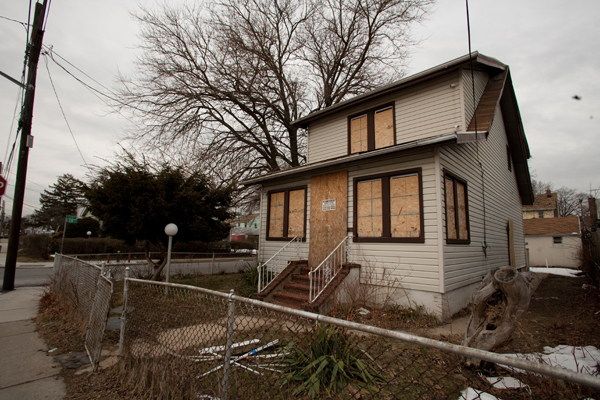Most cities do not sell their tax liens to a private trust. Many have programs which help homeowners pay off their debt and repair their neglected rental properties. Other cities also allow nonprofits to buy back the lien and then work out a payment plan with the property owner.

Colin Lenton
A house in southeast Queens in 2010, an area hard-hit by the foreclosure crisis.In 1996, Mayor Rudy Giuliani decided to sell out New York’s homeowners and tenants—literally.
Before that year, if you were to fall behind on property taxes, the city would put a lien on your home, and eventually foreclose. New York City did just that with thousands of buildings housing more than 100,000 units throughout the seventies and eighties—some vacant, some still occupied. In a city plagued by white flight, high unemployment, and strained public budgets, there wasn’t a lot of incentive back then to remain a landlord. Once the city took over these buildings, it realized it didn’t want to be a landlord, either. Building maintenance was too much to deal with, and conditions for renters rarely improved.
Giuliani took another approach: Sell the debt at a discount to a private trust, and let them deal with it. In this system, the trust (made up of private investors) makes a nice profit through the fees and high interest rates they tack on, and by the eventual sale of foreclosed properties. After the investors get their share, the rest of the proceeds return to the city, making Giuliani’s plan a win-win, right?
Not if you’re a Black, Brown, or elderly homeowner. As gentrification sweeps the city, property taxes are rising faster than incomes, leaving many working people in financially-vulnerable situations. If they can’t afford these higher property taxes, they become easy prey to companies that buy houses cheaply and flip them for a fat profit. In some cases, deed thieves scan the lien-sale lists, track down indebted homeowners and trick them into handing over ownership for the promise of quick financial help. The problem is so bad, the city’s own Tax Lien Sale website warns owners to “avoid predatory lenders,” thereby acknowledging the gaping flaws of its own system. Renters suffer as well: as debts on their buildings mount, many landlords spend as little as possible on maintenance, allowing their buildings to deteriorate until they can dump them onto speculative buyers and pocket the profits. The city has an exemption for properties it defines as “distressed,” but this, too, shows that it already knows that the lien sale can create more problems for tenants.
 CityViews are readers’ opinions, not those of City Limits. Add your voice today!
CityViews are readers’ opinions, not those of City Limits. Add your voice today!
This predatory system doesn’t even make financial sense for the city itself. In research done by the Association of Neighborhood and Housing Development, the proportion of apartment buildings with tax arrears in a neighborhood was the most highly correlated—among 19 variables—with families becoming homeless. The city pays more than $2 billion on homeless services annually, yet it only makes an average of $87 million each year from the lien sale. By giving up its leverage over these properties, the city gives up its ability to enforce better conditions or to transfer ownership from negligent landlords to more responsible—often neighborhood, nonprofit—owners. The system, then, isn’t just immoral, it’s embarrassingly bad policy.
Giuliani’s tax lien system expires at the end of this year, unless our City Council chooses to renew it. The pandemic has already pushed Gov. Andrew Cuomo to suspend the 2020 lien sale —a wise move, but hardly a long-term solution. COVID-19 only exacerbates the financial insecurities New Yorkers struggle under, and once they fall behind in payments, Giuliani’s system does them in with those predatory fees and interest. Don’t believe the hype; any temporary COVID provision the City Council might add to a new Tax Lien bill fails to solve the problem. Nothing short of letting the entire system expire is acceptable.
What instead? Most cities do not sell their tax liens to a private trust. Many have programs which help homeowners pay off their debt and repair their neglected rental properties. Other cities also allow nonprofits to buy back the lien and then work out a payment plan with the property owner. Right now, a coalition of 23 organizations across all five boroughs- spearheaded by the burgeoning Community Land Trust movement here in New York- is pushing for a similar model to replace Giuliani’s outdated system. Several elected officials on the city and state level have already pledged support. In a year where BLM protests have highlighted the rampant racial inequality that still plagues our country, any Council Member choosing to renew the tax lien sale will find themselves on the wrong side of history…Rudy’s side.
John Krinsky is a professor of political science at the City College of New York and a board member of the New York City Community Land Initiative. Memo Salazar is co-chair of the Western Queens Community Land Trust.








